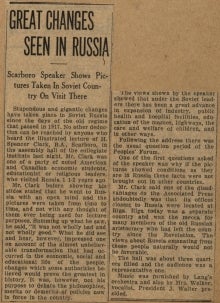Dana Porter Library, first floor
University of Waterloo Library
Waterloo, Ontario N2L 3G1
519-888-4567 x42619 or x42445
n.d.
Scarboro Speaker Shows Pictures Taken In Soviet Country On Visit There
Stupendous and gigantic changes have taken place in Soviet Russia since the days of the old regime that passed in 1917. No other deduction can be reached by anyone who heard the illustrated lecture of H. Spencer Clark, B.A., Scarboro, in the assembly hall of the collegiate institute last night. Mr. Clark was one of a party of noted American and Canadian economic students, educationist or religious leaders, who visited Russia 1 1-2 years ago.
Mr. Clark before showing his slides stated that he went to Russia with an open mind and the pictures were taken from time to time, and not with any thought of them ever being used for lecture purposes. Summing up what he saw, he said, "it was not wholly bad and not wholly good." What he did see and hear, however, impressed one on account of the almost unbelievable transformation that had occurred in the economic, social and educational life of the people, changes which some authorities believed would prove the greatest in history. 'It was, however, not his purpose to debate the philosophies, merits or demerits of policies now in force in the country.
The views shown by the speaker showed that under the Soviet leaders there has been a great advance in expansion of industry, public health and hospital facilities, education of the masses, highways, the care and welfare of children, and in other ways.
Following the address there was the usual question period of the Peoples' Forum.
One of the first questions asked of the speaker was why if the pictures showed conditions as they are in Russia these facts were not brought out in other countries.
Mr. Clark said one of the disadvantages to the Associated Press undoubtedly was that its offices closest to Russia were located at Riga. Riga today was a separate country and was the mecca for many members of the old Russian aristocracy who had left the country since the Revolution. The views about Russia emanating from these people naturally would not be favorable.
The hall was about three quarters filled and the audience was a representative one.
Music was furnished by Lang's orchestra and also by Mrs. Welker, vocalist. President J. Walter presided.





